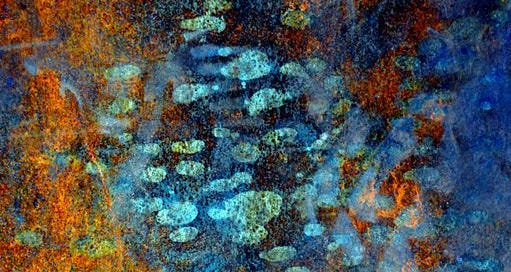There are a few refrains that I turn to again and again when I want to get a clearer sense of who I am beyond what appears in a mirror or an ordinary, limited sense of self.
Some are from Buddhist or Taoist texts that I’ve written about or alluded to on these pages:
“Able to be the mother of the world”
Some are from poems I wrote to capture a particular state of mind where I was “there”: Not-I.
“I am clean, uncluttered space . . .”
“Drifting mindless round the bend, bursting out, bursting in.”
“Vast emptiness, vastly full” is another refrain I turn to that helps me to move beyond a constrictive sense of self to something that feels freer and truer.
It comes from the book On Having No Head, Zen and the Rediscovery of the Obvious by D. E. Harding. Some excerpts follow.
The best day of my life—my rebirthday, so to speak—was when I found I had no head. This is not a literary gambit, a witticism designed to arouse interest at any cost. I mean it in all seriousness: I have no head.
It was eighteen years ago, when I was thirty-three, that I made the discovery. Though it certainly came out of the blue, it did so in response to an urgent enquiry; I had for several months been absorbed in the question: what am I?
. . . . What actually happened was something absurdly simple and unspectacular: I stopped thinking . . . . Reason and imagination and all mental chatter died down. For once, words really failed me. Past and future dropped away. I forgot who and what I was, my name, manhood, animalhood, all that could be called mine. It was as if I had been born that instant, brand new, mindless, innocent of all memories. There existed only the Now, that present moment and what was clearly given in it. To look was enough. And what I found was khaki trouser legs terminating downwards in a pair of brown shoes, khaki sleeves terminating sideways in a pair of pink hands, and a khaki shirtfront terminating upwards in—absolutely nothing whatever! Certainly not in a head.
It took me no time at all to notice that this nothing, this hole where a head should have been was no ordinary vacancy, no mere nothing. On the contrary, it was very much occupied. It was a vast emptiness vastly filled, a nothing that found room for everything—room for grass, trees, shadowy distant hills, and far above them snowpeaks like a row of angular clouds riding the blue sky. I had lost a head and gained a world.
. . . . I seemed to stop breathing altogether . . . . alone and unsupported, mysteriously suspended in the void . . . utterly free of “me”, unstained by any observer. Its total presence was my total absence, body and soul. Lighter than air, clearer than glass, altogether released from myself, I was nowhere around.
. . . . [I]t felt like a sudden waking from the sleep of ordinary life, an end to dreaming. It was self-luminous reality for once swept clean of all obscuring mind. . . . . In short, it was all perfectly simple and plain and straightforward, beyond argument, thought, and words . . . . the sensation of having dropped an intolerable burden.
I’ve had that sensation of being “vast emptiness, vastly full” and it feels more real, more “me”, than my ordinary sense of self. The full-blown experience doesn’t last long, but the sense of it, the memory, the feel of it when I enter those words vast emptiness, vastly full is heady. It takes me somewhat out of myself and into a sense of being that is freer and fuller. And truer. It brings me home to myself.
Which is probably why I love that poem Love After Love by Derek Walcott so much.
The time will come
when, with elation
you will greet yourself arriving
at your own door, in your own mirror
and each will smile at the other’s welcome,
and say, sit here. Eat.
. . . . Feast on your life.




